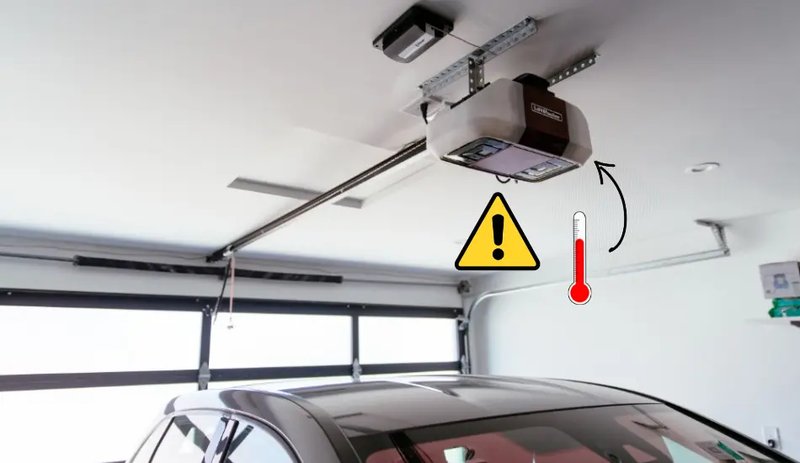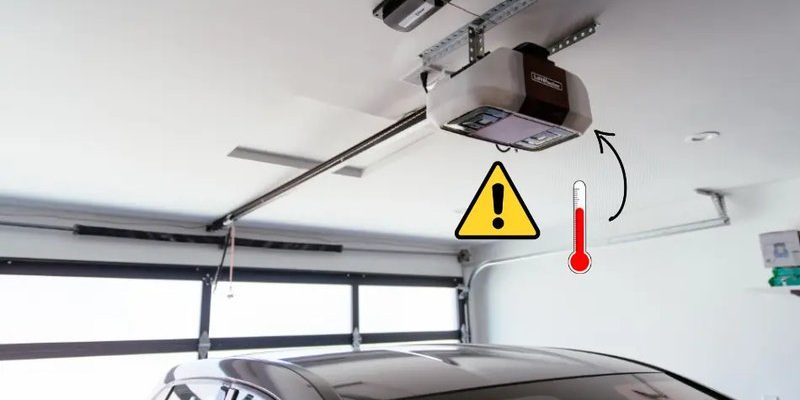
Your garage door opener, whether it’s a Chamberlain or LiftMaster, works hard to ensure your garage door opens and closes smoothly. But just like how our bodies need rest after a workout, your opener may need a break too—especially if it’s struggling with wear and tear or an electrical issue. Let’s take a closer look at the main reasons for overheating and simple, effective prevention strategies you can implement.
Understanding the Basics of Garage Door Openers
Garage door openers are neat little devices that bring convenience to our lives. Think of them as the pulse of your garage door—pushing and pulling, making it move with just the press of a button. Most models use a motor to lift and lower the door, relying heavily on electrical components and gears. If you don’t maintain these parts properly, overheating can occur.
Most openers today are either chain drive, belt drive, or screw drive. The type you have may impact how heat is generated. For instance, a chain drive opener, which is often heavier and more robust, may experience wear more quickly than a belt drive, which, while quieter, has its own quirks. It’s interesting how even the choice of opener can play a role in its efficiency and temperature control.
In truth, learning about your opener isn’t just for your curiosity’s sake. When you understand how it works, you’re better positioned to diagnose issues like overheating and take corrective action before it leads to larger troubles.
Common Causes of Overheating
So, why does your garage door opener overheat? Well, there are several factors at play. Knowing these can make troubleshooting much easier. Here are some top reasons your opener might be running hot:
- Mechanical wear and tear: Like anything that sees regular action, components can start to wear out. Gears might grind, which can create extra friction and heat.
- Electrical issues: Faulty wiring or components can put strain on the motor, causing it to draw more power and overheat.
- Excessive use: If you regularly open and close your garage door, especially in quick succession, the opener can become hot.
- Improper installation: If your garage door opener isn’t set up correctly, it may not operate efficiently and can overheat more easily.
Recognizing these causes can set you on the right path to understand what adjustments or repairs you might need to consider.
Mechanical Wear and Tear
Mechanical wear happens over time and is typically the result of routine use. Picture using a door hinge daily—it can get squeaky or stiff. The same goes for your garage door opener. As parts like the motor and gears operate, they encounter friction which raises their temperature.
This wear can often lead to less effective movement, meaning the motor has to work extra hard to get the door up or down. If you’ve had your opener for years and have started to notice more noise during operation, that’s a sign the internal parts may be wearing down.
Consider performing regular checks on internal components and get ready to replace parts like gears, rollers, or even the entire motor if necessary. Preventive maintenance will always be less costly than waiting for a breakdown.
Electrical Issues
Electricity is fundamental to your garage door opener’s function. It’s what powers the motor, but faulty electrical wiring can create stress and heat. Whether it’s short circuits or damaged wiring, an electrical issue can put excessive strain on the motor.
If you notice that your opener operates erratically—like unexpectedly reversing directions or failing to respond to your remote—it might be an electrical problem. Pay close attention to the power source and connections. Regularly inspect the wiring for signs of wear, and consider calling in an electrician if you’re unsure.
Excessive Use
Have you ever rushed in and out of your garage a dozen times in a day? Your garage door opener is great for convenience, but too much action in a short span can lead to overheating. Think of it this way: if you were sprinting down a track repeatedly without breaks, you’d eventually need to slow down or risk burning out.
If you notice that your garage door opener gets exceptionally hot when you’re using it frequently, it could be time to give it a breather. Allow it to rest between uses, or consider investing in a model designed for heavy-duty performance if your usage is consistently high.
Improper Installation
Sometimes the root of overheating comes from a not-so-positive start—improper installation. A garage door opener that’s not correctly aligned or secured can lead to operational inefficiencies. Imagine trying to drive a car where the wheels are misaligned; it’s just not going to work well!
First, double-check that the opener is level and the door tracks are properly aligned. If you’re unsure how to do this, a professional installer can offer guidance and ensure that everything is set up right, minimizing future problems.
Keeping Your Garage Door Opener Cool: Prevention Techniques
Now that you understand why garage door openers may overheat, let’s talk about ways to prevent this from happening. Here are some actionable tips to keep your opener in good shape:
- Regular Maintenance: Just like changing oil in a car, schedule regular maintenance for your garage door opener. This might include checking gears, lubricating moving parts, and tightening loose fittings.
- Clear the Area: Make sure there are no obstructions around the garage door that could hinder its movement. Keep the area around the opener clean and clutter-free.
- Temperature Awareness: Avoid using your garage door opener in extreme temperatures—even the setup can be affected. If it’s sweltering outside, limit heavy usage, providing some cooldown time.
- Invest in Quality: If you’re in the market for a new opener, look for models with built-in temperature shutdown features. These are designed to prevent overheating by shutting off the motor when it gets too hot.
By taking these preventive measures, you’ll extend the life of your garage door opener and help maintain its efficiency.
Overheating in garage door openers can lead to headaches and unexpected repair bills if not addressed. Understanding the causes—be it mechanical wear, electrical issues, excessive use, or improper installation—empowers you to take proactive steps. Remember to maintain your opener regularly, stay aware of your usage patterns, and ensure proper installation.
Treat your garage door opener with care, and it will keep serving you well for years to come. After all, it’s the unsung hero of your home, providing accessibility and security every day.
